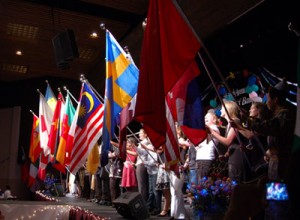Posted 3:47 p.m. Wednesday, May 18, 2011
UW-La Crosse’s efforts to become a more global campus were featured in the Chronicle of Higher Education.
 It’s no secret that UW-La Crosse is a leader in international education.
UW-L’s efforts to become a more global campus were featured in the Chronicle of Higher Education, which declares itself the No. 1 source of news, information and jobs for college and university faculty members and administrators.
“This reaffirms that we are moving in the right direction,” said Jay Lokken, UW-L director of international education. “This community is on the cutting edge of globalization.”
The recognition reflects not just the commitment of university faculty and staff toward a more global campus, but the energy of the broader La Crosse community, Lokken noted. For instance, UW-L has worked closely on internationalization efforts with La Crosse Public Schools and La Crosse’s sister city relationships have been building blocks for more international partnerships.
Over the years UW-L’s international student numbers have soared from 70 international students in 1990 to about 400 today. UW-L ranks fourth among all state institutions in having the most international students behind UW-Madison, UW-Milwaukee and Marquette University.
Similarly, more students, faculty and staff are venturing abroad to gain a more global perspective. The number of students studying abroad during the 1995-96 academic year totaled 85. Today about 450 students participate in study abroad programs each year.
The Chronicle story isn’t the first time UW-L’s Internationalization efforts have been recognized. UW-L was awarded the 2009 U.S. Department of Commerce Export Award for its international student recruiting and programs in December 2009.
Read Chronicle the story.
-“As La Crosse’s experience shows, becoming more international isn’t necessarily the result of a single, and expensive, mega-initiative. Rather, over more than a decade, the university has embraced a series of finite but ultimately far-reaching steps, involving people across the campus: offering professors and staff members modest grants for international travel, forming multifaceted overseas partnerships that can further both faculty research and student exchanges, and pairing foreign students and study-abroad returnees in a support network.”- Chronicle of Higher Education
It’s no secret that UW-La Crosse is a leader in international education.
UW-L’s efforts to become a more global campus were featured in the Chronicle of Higher Education, which declares itself the No. 1 source of news, information and jobs for college and university faculty members and administrators.
“This reaffirms that we are moving in the right direction,” said Jay Lokken, UW-L director of international education. “This community is on the cutting edge of globalization.”
The recognition reflects not just the commitment of university faculty and staff toward a more global campus, but the energy of the broader La Crosse community, Lokken noted. For instance, UW-L has worked closely on internationalization efforts with La Crosse Public Schools and La Crosse’s sister city relationships have been building blocks for more international partnerships.
Over the years UW-L’s international student numbers have soared from 70 international students in 1990 to about 400 today. UW-L ranks fourth among all state institutions in having the most international students behind UW-Madison, UW-Milwaukee and Marquette University.
Similarly, more students, faculty and staff are venturing abroad to gain a more global perspective. The number of students studying abroad during the 1995-96 academic year totaled 85. Today about 450 students participate in study abroad programs each year.
The Chronicle story isn’t the first time UW-L’s Internationalization efforts have been recognized. UW-L was awarded the 2009 U.S. Department of Commerce Export Award for its international student recruiting and programs in December 2009.
Read Chronicle the story.
-“As La Crosse’s experience shows, becoming more international isn’t necessarily the result of a single, and expensive, mega-initiative. Rather, over more than a decade, the university has embraced a series of finite but ultimately far-reaching steps, involving people across the campus: offering professors and staff members modest grants for international travel, forming multifaceted overseas partnerships that can further both faculty research and student exchanges, and pairing foreign students and study-abroad returnees in a support network.”- Chronicle of Higher Education
